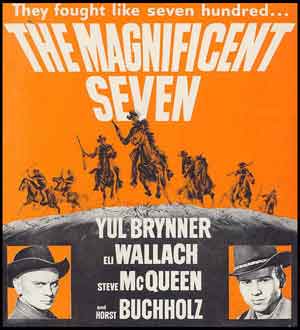For [God’s] purpose is that all [humanity] should be saved and come to realize the truth. And that is, that there is only one God, and only one intermediary between God and [humanity], the man Christ Jesus. He gave himself as a ransom for us all—an act of redemption which happened once, but which stands for all times as a witness to what he is. —1 Timothy 2:4-6, NLT
 My heroes have always been cowboys, to borrow from Willie Nelson. Gunslingers, actually.
My heroes have always been cowboys, to borrow from Willie Nelson. Gunslingers, actually.
Not the Billy the Kid young punk variety, but Shane and The Magnificent Seven—gunslingers who protect the weak from the strong, the good from the bad—and the ugly.
In The Magnificent Seven, the cruel Calvera (played by Eli Wallach, one of film’s best bad guys) is terrorizing Mexican villages, demanding food and money to support his gang of thugs. So long as they pay his ransom, he leaves them in peace.
Tired of being under Calvera’s thumb, one village goes searching for hired guns to even the odds. They find seven down-on-their-luck gunslingers, led by Yul Brynner.
When Calvera returns, he finds things changed. He offers Brynner and his guns a partnership if they’ll turn on the villagers.
“If God didn’t want them sheared, he would not have made them sheep,” sneers Calvera. “What do you think?”
“Ride on,” replies Brynner.
Calvera can’t believe his ears.
“Generosity! That was my first mistake. I leave these people a little bit extra and they hire these men to make trouble. It shows you that sooner or later you must answer for every good deed.”
And the battle is on. The Magnificent Seven take up positions between the town they came to protect and the murderous Calvera. They are a type of intermediary, and in an imitation of Christ, several will lay down their lives to protect the innocent villagers from harm.
Ransom. Intermediary. Redemption. These are words that set Christianity apart. They’re violent words, words terribly familiar to all who have followed events in Iraq.
According to the Christian story, the entire world is held hostage by an evil Calvera. Like poor Mexican farmers, we are simply too weak to resist him. Our only hope lies in being rescued by someone stronger.
In most religious systems, the back story is much simpler. God will reward you if you live well and obey the rules. In some, living well is its own reward.
From the Christian perspective, we have all succumbed to the Stockholm Syndrome. We are dupes, like Patty Hearst. Calvera has brainwashed us. We have made a hero out of our kidnapper.
Going all the way back to the founding of Judaism, the Scriptures tell story after story of human failure: murder, corruption, greed, lust, envy, deceit… the list seems endless. Yet, every generation of hostages seems to be born deaf and blind. We are content in our captivity. Our self-destructive habits have taken on the appearance of normalcy.
As far back as Abraham, God’s love for his creation has impelled him to pay our ransom. The Judeo-Christian God steps into history to stand between Calvera and us. He has redeemed us, because he loves us.
It’s an interesting take on reality.
If true, it means that Calvera still wreaks havoc in the world we live in. And we do see an abundance of evil in the world, despite all the achievements of modernity. Children plot mass murder in their schools. Fanatics fly airplanes into buildings.
If true, it means that Christ has taken Calvera’s blows on his own body. We have been rescued by a strong man, set free from Calvera’s reign of terror.
It’s a good story. I’ll admit to being partial to westerns, and especially when the good guy wins in the end.
Christianity is that kind of story. But, ok—I don’t see Yul Brynner playing Jesus. That would be a stretch, even for Hollywood.


You’ve almost convinced me to give westerns a try (although I did like Tombstone). This is a great post!
Charlie, I have to admit I started reading this post with an idea that I would comment about the world (…especially we single girls!) needing more cowboys. 🙂 But you’ve written a much deeper post (as usual). I love your analogy: “we have all succumbed to the Stockholm Syndrome” – fallen in love with our captor. “content in captivity.” This world really isn’t our home, and you have given us a new and challenging way to see that.